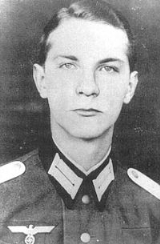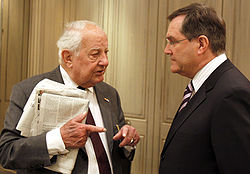
Ewald-Heinrich von Kleist-Schmenzin
Encyclopedia
Ewald-Heinrich von Kleist-Schmenzin (born 10 July 1922) is a former German Army
officer and publisher. A member of the von Kleist
family, his parents were active in the German resistance
against Adolf Hitler
and participated in the July 20 Plot
. He is the last surviving member of the July 20 Plot.
Kleist was born on the family's manor Gut Schmenzin at Schmenzin (Smęcino)
near Köslin (Koszalin)
in the Province of Pomerania. His father was Ewald von Kleist-Schmenzin
(1890–1945).
Like his father, who loathed the Nazi ideology and had criticised it in print as early as 1929, Ewald-Heinrich never had any great love for Hitler or National Socialism. The events of June 30, 1934 – the Night of the Long Knives
– further solidified the young von Kleist-Schmenzin's hatred of the Nazi régime.
In 1940, at age 18, he joined the Wehrmacht
as an infantry
officer. Kleist was personally recruited for the resistance by Claus Graf Schenk von Stauffenberg. In January 1944, with his father's blessing, he volunteered to replace the wounded Axel Freiherr von dem Bussche-Streithorst
for another suicide assassination attempt against Hitler.
Kleist, the company leader, and his men were scheduled to show Hitler new uniforms that had been tested at the front. Kleist planned to set off explosives hidden in his briefcase. He believed that he might have been able to escape alive, even if the briefcase exploded in his hands. But like earlier attempts, the plan was not carried out, as Hitler kept putting off the scheduled uniform demonstration .
On 20 July 1944, Kleist was one of the many supporters and helpers at the Bendlerblock
in Berlin
after the attempt on Hitler's life at the Wolf's Lair near Rastenburg
in East Prussia
. After the plot's failure, he managed to cover up his resistance activities. Proceedings against him were later dismissed for want of evidence in December 1944, thereby sparing Kleist a trial before the Volksgerichtshof
, which almost certainly would have ended with a death sentence, as it did for many of his fellow plotters, including his own father
. However, he was imprisoned in Ravensbrück concentration camp
, and afterwards he was posted to the front for the rest of the war.
After the war, Kleist went into the publishing business, founding his own publishing house, the Ewald-von-Kleist-Verlag. He joined the Protestant Order of Saint John (Bailiwick of Brandenburg), to which his executed father had belonged, admitted as a Knight of Honor in 1957 and promoted to Knight of Justice in 1975. In 1962, Kleist founded the Wehrkundetagung in Munich
, later called, in English
, the Munich Conference on Security Policy
; he moderated it until 1998.

, von Kleist-Schmenzin is portrayed by actor Sebastian Rüger.
German Army
The German Army is the land component of the armed forces of the Federal Republic of Germany. Following the disbanding of the Wehrmacht after World War II, it was re-established in 1955 as the Bundesheer, part of the newly formed West German Bundeswehr along with the Navy and the Air Force...
officer and publisher. A member of the von Kleist
Von Kleist
Von Kleist is a Pomeranian Prussian noble family. Notable members of this family include:* Ewald Jürgen Georg von Kleist ; co-inventor of the Leyden jar* Ewald Christian von Kleist ; German poet and soldier...
family, his parents were active in the German resistance
German Resistance
The German resistance was the opposition by individuals and groups in Germany to Adolf Hitler or the National Socialist regime between 1933 and 1945. Some of these engaged in active plans to remove Adolf Hitler from power and overthrow his regime...
against Adolf Hitler
Adolf Hitler
Adolf Hitler was an Austrian-born German politician and the leader of the National Socialist German Workers Party , commonly referred to as the Nazi Party). He was Chancellor of Germany from 1933 to 1945, and head of state from 1934 to 1945...
and participated in the July 20 Plot
July 20 Plot
On 20 July 1944, an attempt was made to assassinate Adolf Hitler, Führer of the Third Reich, inside his Wolf's Lair field headquarters near Rastenburg, East Prussia. The plot was the culmination of the efforts of several groups in the German Resistance to overthrow the Nazi-led German government...
. He is the last surviving member of the July 20 Plot.
Kleist was born on the family's manor Gut Schmenzin at Schmenzin (Smęcino)
Smęcino
Smęcino is a village in the administrative district of Gmina Tychowo, within Białogard County, West Pomeranian Voivodeship, in north-western Poland. It lies approximately east of Tychowo, east of Białogard, and north-east of the regional capital Szczecin....
near Köslin (Koszalin)
Koszalin
Koszalin ; is the largest city of Middle Pomerania in north-western Poland. It is located 12 km south of the Baltic Sea coast. Koszalin is also a county-status city and capital of Koszalin County of West Pomeranian Voivodeship since 1999...
in the Province of Pomerania. His father was Ewald von Kleist-Schmenzin
Ewald von Kleist-Schmenzin
Ewald von Kleist-Schmenzin was a lawyer, a conservative politician, resistance fighter in Nazi Germany and a member of the July 20 Plot.- Biography :...
(1890–1945).
Like his father, who loathed the Nazi ideology and had criticised it in print as early as 1929, Ewald-Heinrich never had any great love for Hitler or National Socialism. The events of June 30, 1934 – the Night of the Long Knives
Night of the Long Knives
The Night of the Long Knives , sometimes called "Operation Hummingbird " or in Germany the "Röhm-Putsch," was a purge that took place in Nazi Germany between June 30 and July 2, 1934, when the Nazi regime carried out a series of political murders...
– further solidified the young von Kleist-Schmenzin's hatred of the Nazi régime.
In 1940, at age 18, he joined the Wehrmacht
Wehrmacht
The Wehrmacht – from , to defend and , the might/power) were the unified armed forces of Nazi Germany from 1935 to 1945. It consisted of the Heer , the Kriegsmarine and the Luftwaffe .-Origin and use of the term:...
as an infantry
Infantry
Infantrymen are soldiers who are specifically trained for the role of fighting on foot to engage the enemy face to face and have historically borne the brunt of the casualties of combat in wars. As the oldest branch of combat arms, they are the backbone of armies...
officer. Kleist was personally recruited for the resistance by Claus Graf Schenk von Stauffenberg. In January 1944, with his father's blessing, he volunteered to replace the wounded Axel Freiherr von dem Bussche-Streithorst
Axel Freiherr von dem Bussche-Streithorst
Axel Freiherr von dem Bussche-Streithorst , usually referred to as Axel von dem Bussche in English, was a German nobleman, professional Army officer and member of the German Resistance...
for another suicide assassination attempt against Hitler.
Kleist, the company leader, and his men were scheduled to show Hitler new uniforms that had been tested at the front. Kleist planned to set off explosives hidden in his briefcase. He believed that he might have been able to escape alive, even if the briefcase exploded in his hands. But like earlier attempts, the plan was not carried out, as Hitler kept putting off the scheduled uniform demonstration .
On 20 July 1944, Kleist was one of the many supporters and helpers at the Bendlerblock
Bendlerblock
The Bendlerblock is a building in Berlin, located on the Stauffenbergstraße , south of the Tiergarten. The building was erected between 1911 and 1914 for the Imperial German Navy Offices. During the Weimar Republic it served as the seat of the Reichswehr command and the Ministry of Defence...
in Berlin
Berlin
Berlin is the capital city of Germany and is one of the 16 states of Germany. With a population of 3.45 million people, Berlin is Germany's largest city. It is the second most populous city proper and the seventh most populous urban area in the European Union...
after the attempt on Hitler's life at the Wolf's Lair near Rastenburg
Ketrzyn
Kętrzyn , is a town in northeastern Poland with 28,351 inhabitants . Situated in the Warmian-Masurian Voivodeship , Kętrzyn was previously in Olsztyn Voivodeship . It is the capital of Kętrzyn County...
in East Prussia
East Prussia
East Prussia is the main part of the region of Prussia along the southeastern Baltic Coast from the 13th century to the end of World War II in May 1945. From 1772–1829 and 1878–1945, the Province of East Prussia was part of the German state of Prussia. The capital city was Königsberg.East Prussia...
. After the plot's failure, he managed to cover up his resistance activities. Proceedings against him were later dismissed for want of evidence in December 1944, thereby sparing Kleist a trial before the Volksgerichtshof
People's Court (German)
The People's Court was a court established in 1934 by German Chancellor Adolf Hitler, who had been dissatisfied with the outcome of the Reichstag Fire Trial . The "People's Court" was set up outside the operations of the constitutional frame of law...
, which almost certainly would have ended with a death sentence, as it did for many of his fellow plotters, including his own father
Ewald von Kleist-Schmenzin
Ewald von Kleist-Schmenzin was a lawyer, a conservative politician, resistance fighter in Nazi Germany and a member of the July 20 Plot.- Biography :...
. However, he was imprisoned in Ravensbrück concentration camp
Ravensbrück concentration camp
Ravensbrück was a notorious women's concentration camp during World War II, located in northern Germany, 90 km north of Berlin at a site near the village of Ravensbrück ....
, and afterwards he was posted to the front for the rest of the war.
After the war, Kleist went into the publishing business, founding his own publishing house, the Ewald-von-Kleist-Verlag. He joined the Protestant Order of Saint John (Bailiwick of Brandenburg), to which his executed father had belonged, admitted as a Knight of Honor in 1957 and promoted to Knight of Justice in 1975. In 1962, Kleist founded the Wehrkundetagung in Munich
Munich
Munich The city's motto is "" . Before 2006, it was "Weltstadt mit Herz" . Its native name, , is derived from the Old High German Munichen, meaning "by the monks' place". The city's name derives from the monks of the Benedictine order who founded the city; hence the monk depicted on the city's coat...
, later called, in English
English language
English is a West Germanic language that arose in the Anglo-Saxon kingdoms of England and spread into what was to become south-east Scotland under the influence of the Anglian medieval kingdom of Northumbria...
, the Munich Conference on Security Policy
Munich Conference on Security Policy
The Munich Conference on Security Policy is an annual conference on international security policy that is held in the Hotel Bayerischer Hof in Munich, Germany.The 47th Munich Security Conference will be held from February 4th through February 6th 2011....
; he moderated it until 1998.

Portrayal in the media
In the 2004 German production, StauffenbergStauffenberg (Film)
Stauffenberg is a German-Austrian TV movie released in 2004 by Das Erste , about Claus Schenk Graf von Stauffenberg and the 20 July 1944 plot to assassinate Adolf Hitler....
, von Kleist-Schmenzin is portrayed by actor Sebastian Rüger.

